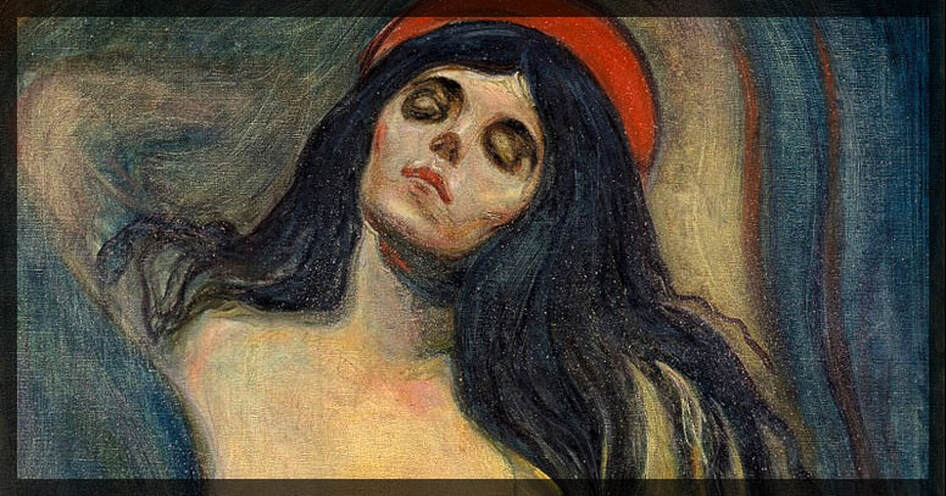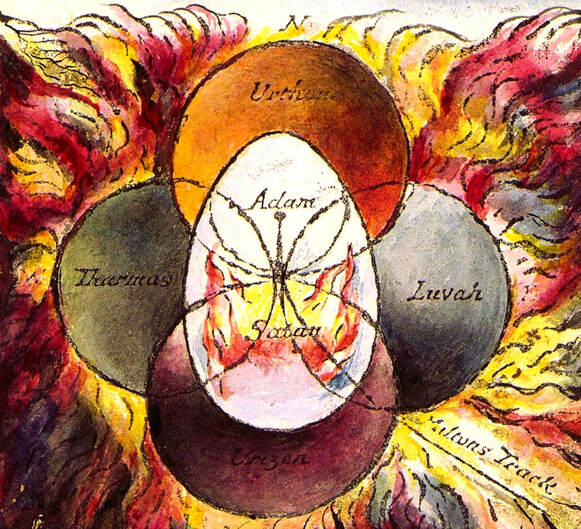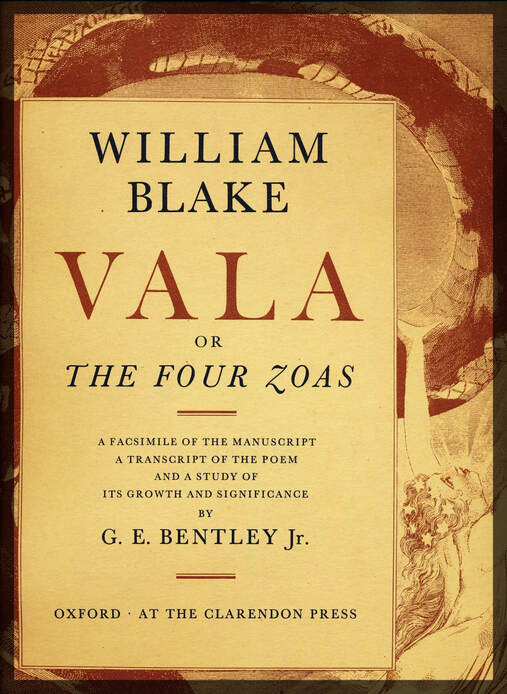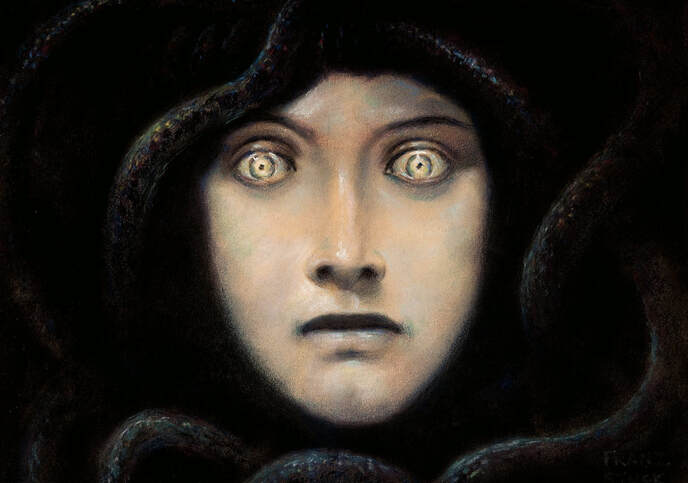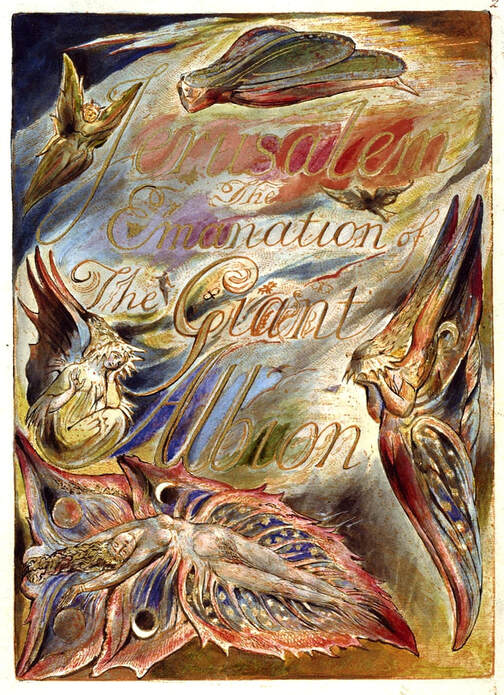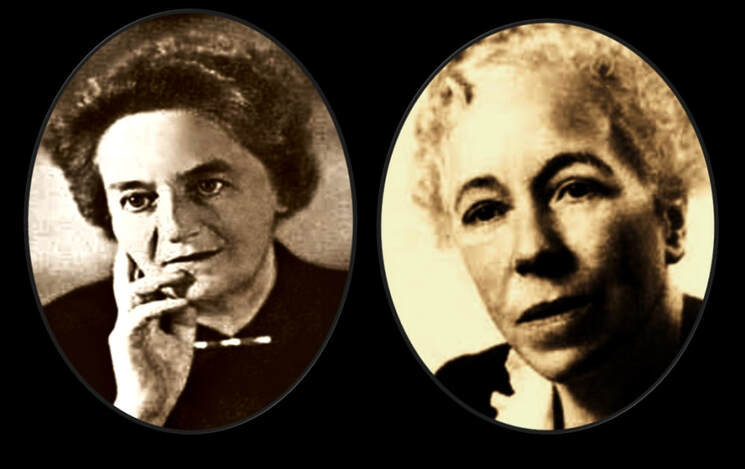BLAKE & WOMEN
.
by Michael Tsarion
|
|
I am in you and you in I, mutual in divine love - William Blake
|
William Blake had a great deal to say about womankind. Not that you'd ever know it by reading most books on his life and work. Not a single literary scholar has done justice to this aspect of his thought and writings. It's just too controversial for them.
Nevertheless, Blake's extraordinary writings explain humanity's fixation on sexuality and pleasure. Long before the advent of Freudian psychoanalysis, he had insightful things to say about love, sex, relationships and gender dynamics. In many respects his analyses has not been surpassed.
Blake's understanding of sexuality is complex and profound, and cannot be encompassed in one short article. His ideas impact not only what we know about masculinity, femininity, desire, sexuality, pleasure and love, but also about conflict, despair, betrayal and neurosis. Blake would not have made a great psychologist, he was a great psychologist. Almost everything we find in the works of Carl Jung, for example, is found in Blake's corpus. This is a fact which still has to be openly acknowledged by the intelligentsia.
Blake's complex corpus cannot be understood unless we are willing to accept his central theme, namely that all experience comes about due to a spiritual fall and spiritual war. Relations between men and women are primarily those of perpetual conflict. Blake attempted to delineate this conflict in his superb poetry and art. He believed that if the schism between men and women isn't satisfactorily resolved, we are doomed to inherit a hellish future, an oblivion from which there is no return.
Blake was a married heterosexual. He was not a Christian, even though he employed motifs from the Old and New Testaments. He was neither an atheist nor Gnostic. In his younger years he was inclined to libertinism, and was certainly iconoclastic. He firmly believed that the only "system" one should follow was that of one's own construction.
Nevertheless, Blake's extraordinary writings explain humanity's fixation on sexuality and pleasure. Long before the advent of Freudian psychoanalysis, he had insightful things to say about love, sex, relationships and gender dynamics. In many respects his analyses has not been surpassed.
Blake's understanding of sexuality is complex and profound, and cannot be encompassed in one short article. His ideas impact not only what we know about masculinity, femininity, desire, sexuality, pleasure and love, but also about conflict, despair, betrayal and neurosis. Blake would not have made a great psychologist, he was a great psychologist. Almost everything we find in the works of Carl Jung, for example, is found in Blake's corpus. This is a fact which still has to be openly acknowledged by the intelligentsia.
Blake's complex corpus cannot be understood unless we are willing to accept his central theme, namely that all experience comes about due to a spiritual fall and spiritual war. Relations between men and women are primarily those of perpetual conflict. Blake attempted to delineate this conflict in his superb poetry and art. He believed that if the schism between men and women isn't satisfactorily resolved, we are doomed to inherit a hellish future, an oblivion from which there is no return.
Blake was a married heterosexual. He was not a Christian, even though he employed motifs from the Old and New Testaments. He was neither an atheist nor Gnostic. In his younger years he was inclined to libertinism, and was certainly iconoclastic. He firmly believed that the only "system" one should follow was that of one's own construction.
|
|
I must create a system or be enslaved by another man's; I will not reason and compare: my business is to create - William Blake
|
|
He was clearly an individualist and Personalist.
Blake's ideas about the nature and purpose of women are both iconoclastic and controversial. He can easily be labeled a misogynist, even though he was not a hater of womankind. In his earlier days he supported women's rights movements, and believed women should be given equal status. Even in later works, his heroine and world savior Jerusalem is presented as female. She is the higher female or feminine principle who comes to restore Albion to wholeness. This she accomplishes by rectifying the many abuses of lower females who resist reconciliation with Spirit.
Blake's ideas about the nature and purpose of women are both iconoclastic and controversial. He can easily be labeled a misogynist, even though he was not a hater of womankind. In his earlier days he supported women's rights movements, and believed women should be given equal status. Even in later works, his heroine and world savior Jerusalem is presented as female. She is the higher female or feminine principle who comes to restore Albion to wholeness. This she accomplishes by rectifying the many abuses of lower females who resist reconciliation with Spirit.
In his Prophetic Books, Blake gives us an idiosyncratic account of the fall of Spirit. His central character is the mighty Albion, representing Spirit. After his descent into darkness, Albion's great body splits into four parts. These are the male "Zoas." Each Zoa fractures again, giving rise to an "Emanation." Hence we have four male Zoas and four female Emanations. They (and other figures) make up Blake's dramatis personae.
The four Zoas are:
The Emanations are:
The four Zoas are:
- Urizen (head)
- Luvah (heart)
- Urthona (genitalia)
- Tharmas (physicality/body)
The Emanations are:
- Ahania (Urizen's Emanation)
- Vala (Luvah's Emanation)
- Enitharmon (Urthona's Emanation)
- Enion (Tharmas' Emanation)
|
|
The great body of Albion (Spirit) falls and divides into four separate identities which eternally war with each other for control over consciousness.
|
|
An Emanation emerges from the body of her Zoa when the latter is in a fatally weakened or broken state.
The fall is perpetuated, says Blake, when a Zoa, in a fragmented state - in the darkness of a fallen world - made the cardinal mistake of falling in love with a part of himself he has disowned and objectified. The phenomenon we know as "femininity" is the result of this colossal error. It is, in every sense, derivative and secondary to the masculine. Disaster occurs if and when this fact is forgotten or resisted.
Furthermore, says Blake, the problem also concerns the corporeal "love" by which a Zoa believes himself freed and restored. Not so, says Blake. It too isn't sufficient, being an all too problematic secondary means to an end. In other words, what we know as love is really an attempt to win back from some attractive stranger that which was once part of oneself. Tragically, every act of reaching out further alienates a soul from attaining its ultimate desire. That which one thinks they love isn't one's own anymore. It resists a return to source and sets its independent will to the task of preserving identity. Love of this kind is akin to need and craving. It enslaves rather than frees.
After experiencing disappointment in relationships, however passionate at first, one eventually settles for lower earthly expressions of love, and forgets about divine love. Profane love blocks access to the sacred, and everyone gets comfortable with it. This was Blake's great worry. Women, said Blake, are the prime beneficiaries of a world replete with images and expressions of profane love.
For Blake, romantic love is born from ignorance and error. In everyday life it's both a convenience and obstacle at the same time. Romantic love is fine as far as it goes, but it does not overwrite the folly of humanity or repair the original problem of spiritual dissociation. Earthly love is not able to do the trick of reuniting Zoa and Emanation. If anything, it prevents unification. It does not address the underlying reasons for the original fall and fragmentation of being. It leads not to bonding, but to bondage. Romantic love is all too often the means by which broken souls reach out in agonized longing for something that never should have been externalized in the first place.
The fall is perpetuated, says Blake, when a Zoa, in a fragmented state - in the darkness of a fallen world - made the cardinal mistake of falling in love with a part of himself he has disowned and objectified. The phenomenon we know as "femininity" is the result of this colossal error. It is, in every sense, derivative and secondary to the masculine. Disaster occurs if and when this fact is forgotten or resisted.
Furthermore, says Blake, the problem also concerns the corporeal "love" by which a Zoa believes himself freed and restored. Not so, says Blake. It too isn't sufficient, being an all too problematic secondary means to an end. In other words, what we know as love is really an attempt to win back from some attractive stranger that which was once part of oneself. Tragically, every act of reaching out further alienates a soul from attaining its ultimate desire. That which one thinks they love isn't one's own anymore. It resists a return to source and sets its independent will to the task of preserving identity. Love of this kind is akin to need and craving. It enslaves rather than frees.
After experiencing disappointment in relationships, however passionate at first, one eventually settles for lower earthly expressions of love, and forgets about divine love. Profane love blocks access to the sacred, and everyone gets comfortable with it. This was Blake's great worry. Women, said Blake, are the prime beneficiaries of a world replete with images and expressions of profane love.
For Blake, romantic love is born from ignorance and error. In everyday life it's both a convenience and obstacle at the same time. Romantic love is fine as far as it goes, but it does not overwrite the folly of humanity or repair the original problem of spiritual dissociation. Earthly love is not able to do the trick of reuniting Zoa and Emanation. If anything, it prevents unification. It does not address the underlying reasons for the original fall and fragmentation of being. It leads not to bonding, but to bondage. Romantic love is all too often the means by which broken souls reach out in agonized longing for something that never should have been externalized in the first place.
|
|
Two wills they had, two intellects, and not as in times of old - William Blake
|
Sadly, this is not, says Blake, were the problem ends. Now that an Emanation has been invested with a semblance of life and individuality, there is no reason why it needs to reciprocate a Zoa's ardors. Doing so weakens rather than strengthens its identity. At least this is the Emanation's fear.
Indeed, it is not bonding and love that ensue in Blake's epic dramas, but perpetual conflict. The female will is a will unto itself, and it perpetually resists reunification. It is the source of the narcissistic attitude which vehemently holds on to its own identity, vision and destiny.
Indeed, it is not bonding and love that ensue in Blake's epic dramas, but perpetual conflict. The female will is a will unto itself, and it perpetually resists reunification. It is the source of the narcissistic attitude which vehemently holds on to its own identity, vision and destiny.
|
|
...when that inchoately conscious complex, the ego, the son of the darkness, knowingly sundered subject and object, and thus precipitated the world and itself into definite existence, giving it and itself a voice and a name - Carl Jung
|
As time goes by, and the female will continues to resist reunification, the condition of the Zoa becomes all the more perilous. It falls into deeper sleep and ignorance. In the end there's nothing left of the Zoa. It fades into the abyss of the unconscious. Just before its final demise, it throws up a "specter" which makes a last ditch effort to save the day. However, if the call to an Emanation fails, if she refuses to dialogue and renounce her narcissistic demeanor, the specter turns violent and attacks or rapes her.
|
|
In Blake's great corpus, the Emanations represent women who prefer profane expressions of love. Enamored by romantic love, they mate and breed the next generation of fallen, ignorant souls. Indeed, Blake refers to our dimension or plane of existence as "Generation." It is dominated by Vala, a figure representing the apotheosis of female will. Vala and the other Emanations maintain their dominion over the world and cosmos only as long as they can seduce and waylay the male spirit. They offer their male counterparts any amount of profane love to keep them from remembering their divine origin. Their entrapments include profane expressions of pleasure and sex, suitable to the gross palate of fallen souls. They also dissipate masculine energy by directing men toward rational fixations, namely to the intellectual pursuits required by mundane religion and science. In the end, man is so enamored by his worship of the female will, that he loses his spiritual essence altogether, and lives out his life delighted by its absence. Instead of loving love, he loves woman.
|
|
Jung would see it thusly: a Blakean specter represents any man whose ego-structure has been drastically undermined by a woman or any number of women with whom he had or has contact. The more emotionally close and dependent he has become, the more likely his will is "feminized" in the negative sense.
As far as Blake was concerned, the specter's violence is justified. It's simply the expected reaction to the prolonged violence of an Emanation, who, through thick and thin, turns her back on the spiritual wedding which reawakens the divine love capable of restoring man and cosmos to wholeness.
As far as Blake was concerned, the specter's violence is justified. It's simply the expected reaction to the prolonged violence of an Emanation, who, through thick and thin, turns her back on the spiritual wedding which reawakens the divine love capable of restoring man and cosmos to wholeness.
|
|
Love seeketh not itself to please, nor for itself hath any care, but for another gives its ease, and builds a heaven in hell's despair - William Blake
|
The resistence and narcissism of the female will has devastating effects on the male psyche. It turns the natural into the unnatural, the whole into the shard. It negatively impairs sexuality and intimate relations between the sexes. This is a travesty because, in the fallen state, sex serves men and women as a "taster" or reminder of the ecstatic biunity that once was, and can be again.
What Blake worked so hard to dramatize has the greatest meaning for today's war of the sexes. Too bad no other scholar competently broaches this key aspect of his work. Even the most eminent Blakean scholars avoid it like the plague. Shame on all of them.
Transposing Blake's perceptive psychodrama to domestic and social spheres, we see that problems begin with the mother-child relationship. There's a good reason why psychologists equate motherhood with tyranny and vice versa.
A mother may correctly pleasure her child, or may turn him against pleasure forever. She can either teach her child to regard pleasure as perfectly natural and good, or deprive him of it, thereby installing an attitude of suspicion and morbid repulsion. A child with a mother of this sort, grows to be shameful and self-condemning for every natural desire for pleasure welling up within him. It is this kind of creature, says Blake, that builds the jails, schools and churches of oppression.
What Blake worked so hard to dramatize has the greatest meaning for today's war of the sexes. Too bad no other scholar competently broaches this key aspect of his work. Even the most eminent Blakean scholars avoid it like the plague. Shame on all of them.
Transposing Blake's perceptive psychodrama to domestic and social spheres, we see that problems begin with the mother-child relationship. There's a good reason why psychologists equate motherhood with tyranny and vice versa.
A mother may correctly pleasure her child, or may turn him against pleasure forever. She can either teach her child to regard pleasure as perfectly natural and good, or deprive him of it, thereby installing an attitude of suspicion and morbid repulsion. A child with a mother of this sort, grows to be shameful and self-condemning for every natural desire for pleasure welling up within him. It is this kind of creature, says Blake, that builds the jails, schools and churches of oppression.
Thou, mother of my mortal part,
With cruelty didst mould my heart,
And with false self-deceiving tears
Didst bind my nostrils, eyes, and ears,
Didst close my tongue in senseless clay,
And me to mortal life betray.
The death of Jesus set me free:
Then what have I to do with thee?
(William Blake, Tizrah)
With cruelty didst mould my heart,
And with false self-deceiving tears
Didst bind my nostrils, eyes, and ears,
Didst close my tongue in senseless clay,
And me to mortal life betray.
The death of Jesus set me free:
Then what have I to do with thee?
(William Blake, Tizrah)
The lower female's toxic resistant will is obviously only conceivable in relation to its opposite, the positive, healthy will of the higher female. As a mother, lover or consort, her attitude is open, empathic and sensual. She has experienced fallout from her narcissistic attitude and transcended it. No matter what kind of male she encounters, even if he be a sad specimen, she is not willing to alienate herself behind a veil of narcissism and spiteful accusation. She knows she damages herself the moment she adopts such as hostile attitude. Consequently, she chooses not to be possessed by Vala, but by Jerusalem.
The lower female, on the other hand, deprives men of sex and pleasure. Even if she offers sex and pleasure, she does so with an underlying feeling of repulsion and resentment. As soon as this attitude is registered by her mate, a specter takes birth, and sex becomes fused with violence. If things persist, he develops a cocktail of emotional and physical ailments with no idea about what is happening or what is truly wrong with him. Women, says Blake, benefit from man's dissociation in this regard. When women speak of men needing to become "more feminine," not one man in a million knows what is truly meant by it. It means becoming more and more entrapped in the webs of female deception and less knowledgeable about the true nature of desire and sexuality. For the narcissistic female, man is never to find out why his sexual desires and actions are contaminated by violence. As long as he's blindly violent, women are free to eternally blame him for every other wrong, including whatever is wrong with them. The higher female wants none of it.
The lower female, on the other hand, deprives men of sex and pleasure. Even if she offers sex and pleasure, she does so with an underlying feeling of repulsion and resentment. As soon as this attitude is registered by her mate, a specter takes birth, and sex becomes fused with violence. If things persist, he develops a cocktail of emotional and physical ailments with no idea about what is happening or what is truly wrong with him. Women, says Blake, benefit from man's dissociation in this regard. When women speak of men needing to become "more feminine," not one man in a million knows what is truly meant by it. It means becoming more and more entrapped in the webs of female deception and less knowledgeable about the true nature of desire and sexuality. For the narcissistic female, man is never to find out why his sexual desires and actions are contaminated by violence. As long as he's blindly violent, women are free to eternally blame him for every other wrong, including whatever is wrong with them. The higher female wants none of it.
|
|
...Vala, thy sins have lost us heaven and bliss. Thou art our curse - William Blake
|
|
|
The word Vala connotes "veil." Albion falls in love with Vala and falls into darkness. The Emanations can always accuse the male Albion, and the Zoas, of causing the original fall. By so doing, says Blake, the state of fall is perpetuated eternally. All attempts at restoration by the Zoas are henceforth directed by the female will, and end in chaos. Vala is portrayed as the first deceiver. After Albion's falls in love with her, Vala mysteriously appears before him as an androgyne, that is as both a male and a female. Confused by this Albion gives birth to Urizen, god of Reason and Light. Albion is then able to discriminate between the two polarities of Vala. It is these acts of polarization, objectification and rationalization. says Blake, that leads to the fall of Spirit and "Fourfold Vision." Urizen, with his giant compass, takes control of consciousness. The other Zoas and Emanations war against his iron control, each conspiring to take his place.
|
|
Once the specter takes control - when sex and violence become largely indistinguishable - the psyche of the male becomes completely diseased, especially in terms of his understanding of women. As Freud and other psychologists quickly realized, the male psyche is often drenched in guilt over every yearning for pleasure, and every demand for sexual fulfillment. A man in this sorry condition finds a semblance of alleviation either by deifying women as goddesses, or demonizing them as bitches, witches and whores. Ultimately, neither outlook frees him from the spell.
|
|
Failing to receive what I so desperately desire, I strike out forcibly to attain it from that which will destroy me for my desire...
|
|
Today's delusional Feminist believes that violence is characteristic of men only. It's purely a matter of male derangement and recalcitrance. Mothers and lovers are never indicted. They are invariably victims on the receiving end.
Blake laughed at tawdry notions of this kind. No, the fault lies predominantly with the female will. The pecadilloes of males, no matter how repulsive and malignant, are not natural manifestations. They are unfortunate reactions to deeper crimes and aberrations.
Blake laughed at tawdry notions of this kind. No, the fault lies predominantly with the female will. The pecadilloes of males, no matter how repulsive and malignant, are not natural manifestations. They are unfortunate reactions to deeper crimes and aberrations.
|
|
You're hot and bothered because I'm attractive to other men...Jeez, you don't know how glad I am to hear that...
|
|
|
|
Cruelty has a human heart, and jealousy a human
face - William Blake |
Man innocently reaches out in a state of longing, but is unrequited. He does not find women who yield to his needs. Rather, he finds women who either resist him or devilishly exacerbate the conflict within him, seeking to further weaken and debase the masculinity that so offends them.
Due to the rebuffs, squabbling and machinations of the female will, man's relations with women becomes characteristically sadomasochistic. He loves but hates himself for it. He desperately requires care, rest and pleasure, but comes to despise himself for expressing natural needs and desires. He comes to despise pleasure itself, and designs a world to insulate himself from it. Hence the urban nightmare of simulacras in which we exist. Plenty of tantalizing images of pleasure, but none of the real thing.
Most men have no idea that their nightly fantasies and wish-fulfilments disguise violent intentions. They avoid psychologists who'll eventually make this clear to them. These intentions are repressed and concealed under the veil of "sexual desire." Even in the case of obsessive sexual longing and fantasies, the male is rarely consciously aware of the reasons for his plight. He cannot be satiated until he finds a sadistic female who gleefully returns to him the violence he secretly wishes to unleash on others.
Due to the rebuffs, squabbling and machinations of the female will, man's relations with women becomes characteristically sadomasochistic. He loves but hates himself for it. He desperately requires care, rest and pleasure, but comes to despise himself for expressing natural needs and desires. He comes to despise pleasure itself, and designs a world to insulate himself from it. Hence the urban nightmare of simulacras in which we exist. Plenty of tantalizing images of pleasure, but none of the real thing.
Most men have no idea that their nightly fantasies and wish-fulfilments disguise violent intentions. They avoid psychologists who'll eventually make this clear to them. These intentions are repressed and concealed under the veil of "sexual desire." Even in the case of obsessive sexual longing and fantasies, the male is rarely consciously aware of the reasons for his plight. He cannot be satiated until he finds a sadistic female who gleefully returns to him the violence he secretly wishes to unleash on others.
No comment...
For compulsively aggressive men, the situation differs only in terms of degree. The violent rapist doesn't guess that he is possessed by a specter, and that even in his abuses and violations of women he's searching for wholeness. Even if he finds himself capable of openly articulating his hostility toward women, he is usually unable to deduce how female abuse has undermined his masculinity. He'll never receive any clues from women.
Blake's analysis goes much futher than this. As said above, the female who begrudgingly offers her mate sex and pleasure, but who is inwardly adverse to her actions, not only feels repulsion toward her partner for yielding to natural impulses, but also, says Blake, despises herself for being the person looked to for satiation. The dynamic awakens feelings of guilt and shame. It also causes her to pull back and not hurt herself. In certain cases she acts so hapharzardly that her mate is forced to look elsewhere for what he needs. Again, he has no idea about what causes his partner's bizarre hot and cold behavior.
Blake warned that by undermining the male will, narcissistic females eventually bring themselves to ruin. As a Zoa falls into darkness, the offending Emanation also finds herself weakening and fading into non-being. Although she cries out in regret, she is not forgiven. She falls into hell and cannot be saved under any circumstances. Blake believed this declination into a frightful hades-like abyss happens to whole civilizations, if and when they allow themselves to be dominated by the lower female will. In some works he prefers a happy ending, so to speak. This is attained by the intervention of the higher female Jerusalem.
|
|
Frontispiece of Jerusalem, by William Blake. This story has a happy-ending. Jerusalem is rendered as a goddess, the Emanation of the once divine Albion. She redresses the "sins" of lower female Emanations and restores Albion to wholeness. In other works Blake was not as optimistic about the outcome of the great war of the sexes.
|
|
This is the corrupt dynamic that gives rise to what we know and experience as love and sex. It's what gives rise to temptation, seduction, rape, masochism, and all manner of pathological complexes and syndromes that plague our societies. It has a single source, says Blake: woman continually receiving the love which was once directed to love itself.
Go ahead girl, shake it...
Blake perceptively shows that the violent female will oppresses females as well as males. Take a common neurotic trait in women - frigidity. What does Blake make of this oddity? He would say that the Feminists are wrong to lay this problem at the door of men. If a girl or woman becomes frigid, she's denying men access to her body. Why so? Is it truly due to her having been hurt, in one way or another, by a man or men? That's what she wants everyone to believe. It's what Feminists readily accept, right?
A modern psychiatrist is likely to diagnose the condition in concrete terms, with frigidity being a symptom found in people with nothing to give to others. They have no love to give to others or (and this is crucial) to themselves.
There are many reasons for this bizarre syndrome, which cannot be explored here in any depth.
A modern psychiatrist is likely to diagnose the condition in concrete terms, with frigidity being a symptom found in people with nothing to give to others. They have no love to give to others or (and this is crucial) to themselves.
There are many reasons for this bizarre syndrome, which cannot be explored here in any depth.
|
|
Helene Deutsche (1884-1982) and Karen Horney (1885-1952), were the first professional psychologists to write about the causes of frigidity, a complaint experienced by nearly 80 percent of modern women. The condition cannot be cured until women look for solutions in the right place.
|
|
Simply put, a frigid woman becomes frigid because she cannot enter into intimate relationships without giving this painful secret away to herself. It seems more logical to make herself sicker trying to avoid the dreadful truth. Instead of entering a nunnery, as in bygone days, she coldly recoils from relationships in order to avoid confronting what she secretly suspects about herself.
She retreats from the world and from intimacy to become a mere cold-eyed observer. She deceives herself about her choice, thinking it perfectly morally good. She also sees herself as superior to others for her icy detached attitude. Of course, time proves her tragically wrong.
Blake knew all about human error, and certainly knew about this act of folly by many women. When an Emanation acts against her own interests for too long - when she succeeds in killing love for others and herself - she operates as a "Shadow." Hence Blake's descriptions of the shadow of Vala and Enitharmon, etc. He would have diagnosed modern women as Emanations who now operate on this ghostly predatory level. They flagrantly display tantalizing images of sexuality and pleasure, and secretly chuckle over ignorant men's enthrallment.
Although most men happily sign on as co-conspirators in this diabolic crime, Blake advises us not to lose sight of the primary souce of evil, in this regard.
Female frigidity is but one manifestation of this spiritual declination, but there are many others. The frigid woman's personality type can't be fathomed until we get to the root of her syndrome, which is the hate she feels for herself, as a perpetrator of the crime of destroying love and replacing it with alluring images of love. She also hates herself for entrapping mankind in her deceptive veils.
She hates that women of her kind have, for centuries, presented frigid faces before the world as something alluring and mysterious, or, in the case of Christian iconography, as "saintly."
She retreats from the world and from intimacy to become a mere cold-eyed observer. She deceives herself about her choice, thinking it perfectly morally good. She also sees herself as superior to others for her icy detached attitude. Of course, time proves her tragically wrong.
Blake knew all about human error, and certainly knew about this act of folly by many women. When an Emanation acts against her own interests for too long - when she succeeds in killing love for others and herself - she operates as a "Shadow." Hence Blake's descriptions of the shadow of Vala and Enitharmon, etc. He would have diagnosed modern women as Emanations who now operate on this ghostly predatory level. They flagrantly display tantalizing images of sexuality and pleasure, and secretly chuckle over ignorant men's enthrallment.
Although most men happily sign on as co-conspirators in this diabolic crime, Blake advises us not to lose sight of the primary souce of evil, in this regard.
Female frigidity is but one manifestation of this spiritual declination, but there are many others. The frigid woman's personality type can't be fathomed until we get to the root of her syndrome, which is the hate she feels for herself, as a perpetrator of the crime of destroying love and replacing it with alluring images of love. She also hates herself for entrapping mankind in her deceptive veils.
She hates that women of her kind have, for centuries, presented frigid faces before the world as something alluring and mysterious, or, in the case of Christian iconography, as "saintly."
It's all terribly holy...
For Blake, pathological phenomena of this kind must be understood and terminated. Its typifies the human penchant for self-deceptiveness. His life's work constitutes a deep investigation and explanation of its roots.
|
|
Camille Paglia. An expert on English literature and literary types, she bravely comments on the bizzarity of female beliefs and behavior. She also debunks the lies of Feminists attempting to place the blame for the world's ills on men alone. Her masterly book Sexual Personae was turned down by numerous publishers. Her comments on female rape-fantasies also caused worldwide consternation. As a committed Freudian, she sees most women as grown-up children with the emotional intelligence of 8 year olds. The trouble is that feminized women are making most men into replicas of their sort.
|
|
|
|
Pretty women walking with gorillas down my street - Joe Jackson
|
Genius that he was, Blake didn't leave it there. The truth of the matter is this: Before a girl becomes a full-grown woman, she knows she wields the power to empower or destroy men. She realizes that with her beauty and sexuality comes a moral dilemma. She observes her female friends and associates to see what they do. She soon sees the damage cases left in states of despair by callous females. Life demands she makes up her mind as to whether this is the path she'll take or not.
Even a moral woman can fall into temptation, desiring on some occasions to test her power. Most women go right ahead and hurt men for this very reason. And most men have no idea what's going on.
Even a moral woman can fall into temptation, desiring on some occasions to test her power. Most women go right ahead and hurt men for this very reason. And most men have no idea what's going on.
|
|
The camouflage of beauty hides who I really am from myself...
Blake was all too aware of a woman's dilemma over how she negotiates the tyranny of beauty. Will she use her natural beauty and sexuality to awaken men to their divinity, or to keep them entrapped in profane desire? Blake's great Prophetic Books explore this issue in detail. |
|
|
|
We always forgive a woman one murder - John Wayne
|
The other course, as said - apparently born from a higher sense of morality - is taken when a woman finally decides to withhold physical contact with men. Thinking she honors her conscience, she chooses what she believes is the lesser of two evils.
In effect, she commits the secondary crime of withholding sex from men to avoid bringing them to perdition. Such a woman may cover her ruse by consciously disparaging men. They're disgusting sex-addicts and silly children...They are horrid womanizers and boozers...They want it all their own way...Why can't they grow up?...They don't deserve me. So it goes.
Such a type does not want to feel guilty for violating the male will. Deprivation is easier to endure than the hurt that may come from placation...It's for their own good...Suffering is good for the soul...Loving me will only prove painful in the end...It's my job to save them from this terrible fate...I won't play grotesque sexual games, and therefore can't be blamed for any man's sorrow or fall.
Possibly a frigid type witnessed the dastardly way many women treat good men. Maybe the banter and rapacious activities of her girlfriends and dance-club cronies repulse her. Consequently, she chooses all-out frigidity. Alternatively, she becomes a lesbian. She may even begrudgingly settle for a loveless heterosexual relationship, convincing herself that her mate is "better off" with her than some seductive vamp.
In effect, she commits the secondary crime of withholding sex from men to avoid bringing them to perdition. Such a woman may cover her ruse by consciously disparaging men. They're disgusting sex-addicts and silly children...They are horrid womanizers and boozers...They want it all their own way...Why can't they grow up?...They don't deserve me. So it goes.
Such a type does not want to feel guilty for violating the male will. Deprivation is easier to endure than the hurt that may come from placation...It's for their own good...Suffering is good for the soul...Loving me will only prove painful in the end...It's my job to save them from this terrible fate...I won't play grotesque sexual games, and therefore can't be blamed for any man's sorrow or fall.
Possibly a frigid type witnessed the dastardly way many women treat good men. Maybe the banter and rapacious activities of her girlfriends and dance-club cronies repulse her. Consequently, she chooses all-out frigidity. Alternatively, she becomes a lesbian. She may even begrudgingly settle for a loveless heterosexual relationship, convincing herself that her mate is "better off" with her than some seductive vamp.
|
|
A little more skin Luv! Fortunately, not all women want to be seductresses, or as Blake would have put it, they don't want to bring about their own moral impeachment by obsessing or hurting men. No good, says Blake, the frigid type is no better than the seductress. Her passivity is an affront to her own spirit. She has a purpose in life and better get on with it. She wins no points by neglecting her spiritual duty.
|
|
Blake regarded female frigidity as an unsatisfactory remedy to male-female sexual conflict. For Blake it was yet another way in which females hurt themselves in their attempts to either enslave men or free them from enthrallment.
Although the frigid women can be deemed "moral" enough to acknowledge the devastating power of sexuality and beauty, she is not in fact motivated by any true care for men. Her dilemma concerns how to not hurt herself.
She desires to not be molested by feelings of guilt and shame, and wishes to preserve her fortuitous position in society. Cut off all feeling and never be harassed by the consequences of abominable moral deviance.
As common as this is, it's not a proper solution, says Blake. Such a type, believing herself the savior of mankind, becomes so self-righteous and morally inflated that she soon believes herself to be in the company of angels. This "saintly" type is found in all the churches and ashrams of the world. She's the "martyr" type who willing sacrifices her physical and emotional needs for the "good of humanity." Her favorite word is "love."
Although the frigid women can be deemed "moral" enough to acknowledge the devastating power of sexuality and beauty, she is not in fact motivated by any true care for men. Her dilemma concerns how to not hurt herself.
She desires to not be molested by feelings of guilt and shame, and wishes to preserve her fortuitous position in society. Cut off all feeling and never be harassed by the consequences of abominable moral deviance.
As common as this is, it's not a proper solution, says Blake. Such a type, believing herself the savior of mankind, becomes so self-righteous and morally inflated that she soon believes herself to be in the company of angels. This "saintly" type is found in all the churches and ashrams of the world. She's the "martyr" type who willing sacrifices her physical and emotional needs for the "good of humanity." Her favorite word is "love."
It's not much different for the deluded male. Petrified by the hidden violence lurking behind his sexual desires, he renounces malehood as if it's a dirty thing. He generally morphs into an ascetic, celibate or homosexual; a sublimation all too familiar today.
|
|
Arrested sexuality in a male can take on many a guise. Sex becomes repulsive to those who understand on some level that it equates with violence. However, if I spend time with people who cannot possibly have done any evil, I can have no animosity toward them, and am relieved of the pressure of my conscience.
|
|
The deluded man may find himself becoming physically impotent, without understanding why. He may never catch on to the underlying dilemma, that he does not wish to unleash violent impulses against those he cares for. Caught in this syndrome, he may compensate by exalting all women into goddesses, so he can asexually worship them from afar. This, Blake believed, is the cause of all religion, specifically for Christianity.
|
|
I don't want to rape and violate the woman I care for... that's only for those I don't care about, right? Many jailed rapists and serial-killers had wives and families at home. This also explains why so many action films invariably show sex scenes followed by scenes of violent torture, murder and death.
|
|
Blake's analysis of female narcissism was not born out of hatred toward women. He understood the positive power of beauty and sexuality and did not want to see their misuse causing or perpetuating a state of spiritual fall. In his mind it was for women to step up to the plate and set things aright. As keepers of a great power, the onus is on them to never misuse it.
Blake contrived an epic story of Zoas, Emanations, Specters and Shadows in order to expertly dissect the problem. His goal was to restore civilization to health and to free humanity from false religion and science, these being the nightmarish preoccupations of man in his fallen state, his erroneous attempts at illuminating the darkness in which he dwells.
Blake wished to show that by hurting men, narcissistic women only condemn themselves to a hell from which there is absolutely no redemption. By refusing her true destiny - to lead man to wholeness - woman loses her footing and tumbles into perdition and eternal night. Blake believed we're already standing at the edge of a precipice. The second and final "Fall" is at hand, and ignorance, as always, is no excuse.
Blake contrived an epic story of Zoas, Emanations, Specters and Shadows in order to expertly dissect the problem. His goal was to restore civilization to health and to free humanity from false religion and science, these being the nightmarish preoccupations of man in his fallen state, his erroneous attempts at illuminating the darkness in which he dwells.
Blake wished to show that by hurting men, narcissistic women only condemn themselves to a hell from which there is absolutely no redemption. By refusing her true destiny - to lead man to wholeness - woman loses her footing and tumbles into perdition and eternal night. Blake believed we're already standing at the edge of a precipice. The second and final "Fall" is at hand, and ignorance, as always, is no excuse.
. . .
Michael Tsarion (2021)
